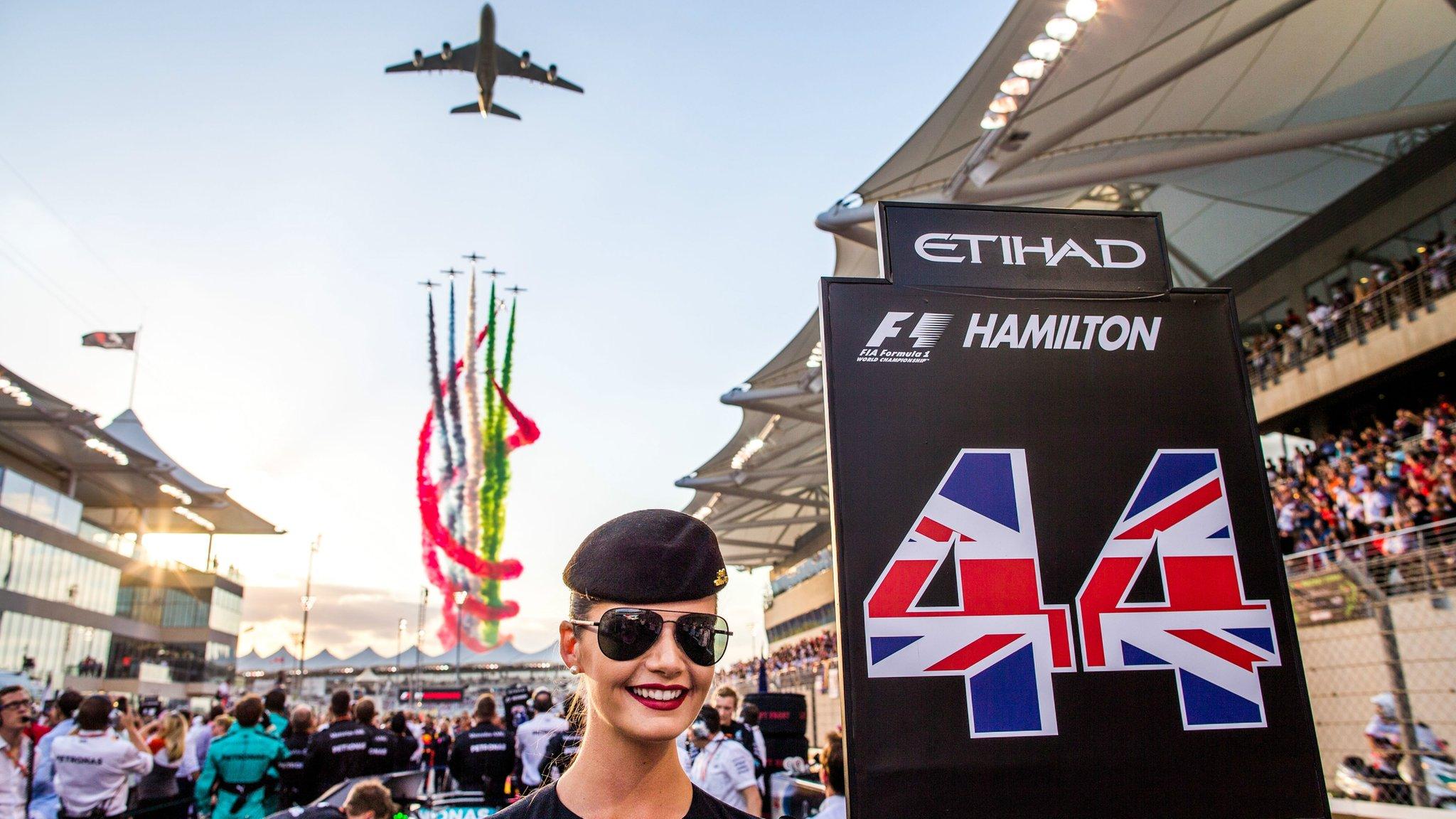Russian GP: A baddie today or an idiot tomorrow? Which would you be?
- Published
- comments
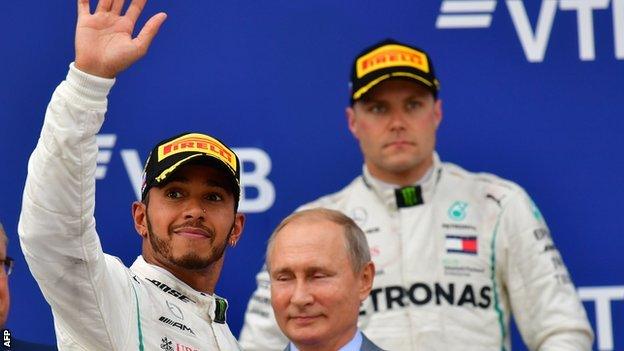
Valtteri Bottas' expression says it all on the podium after he was forced to let Mercedes team-mate Lewis Hamilton past during the Russian Grand Prix
"You need to weigh it up. Do I want to be the baddie on Sunday evening for many of the right reasons or the idiot in Abu Dhabi at the end of the season? I would rather be the baddie today and not the idiot at the end of the year."
That is how Mercedes Formula 1 boss Toto Wolff justified his decision to impose team orders for Valtteri Bottas to hand victory in the Russian Grand Prix to team-mate Lewis Hamilton.
Wolff was making a simple point - sport is unpredictable. And while the 50-point lead over Ferrari's Sebastian Vettel with which Hamilton left Sochi on Sunday might look comfortable, it could diminish dramatically in an instant.
As Hamilton put it: "The heads of the team are really nervous for these last races. If something happens - engine failure, a tyre blow-out, whatever it may be - and we lose the World Championship by one or three points, they will look back and say: 'We are a team and we didn't work as a team.'"
In that scenario, Hamilton said: "We wouldn't have been been able to live with ourselves."
Hamilton, who often talks about not wanting to benefit from team orders, said he was "the most conflicted I ever feel I have been" after the race. And he eloquently - and apparently completely genuinely - expressed why that was.
Wolff, too, patiently answered questions as to the rights and wrongs of the situation. He was given a hard time, his previous claims of wanting to let the drivers race thrown back at him. But those have only ever been given with caveats, and this was one of those situations where caveats apply.
"Rationally," Wolff said, "it was the right decision, but our sporting heart says no."
Mention of a "sporting heart" in this context will stick in the throat of many. For this is the very antithesis of what many people feel they want when they watch sport for the drama and competition, the thrill of seeing the most talented athletes in a given discipline test themselves against each other.
But Formula 1 is a complex endeavour - which has never solely been about individuals, however much those watching might romanticise the role of the drivers - and this was a complex situation.
How did Mercedes come to the decision?
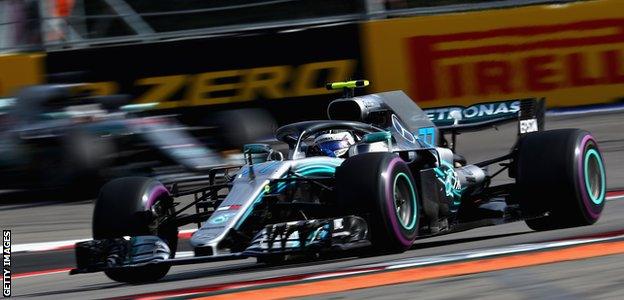
Bottas took his sixth career pole in Sochi but a fourth career win was not to be
On Sunday morning, Mercedes had discussed with their drivers how to handle the race, but the situation that unfolded was not one they had anticipated. And that is not to say the drivers who qualified one-two-three running in that order, but rather the circumstances in which they were doing so.
The start, Mercedes handled exactly as planned. There was a fear that Vettel, starting third, would use the slipstream on the longest run to the first corner of the season to sweep into the lead, as Bottas had done to the Ferraris when their positions were reversed in 2017.
So Bottas ensured that Hamilton got a tow from him as they accelerated off the line. That ensured Hamilton fended off Vettel, and the Mercedes drivers were able to secure first and second places on the first lap.
But then, as Wolff put it, Mercedes "got tangled up in the way we called the pit stops".
Had Mercedes gone into the race planning to secure a win for Hamilton, the easiest way would have been to bring him in first for fresh tyres. But they stuck to a 'normal plan' of giving the leader the advantage, and the first stop went to Bottas.
Vettel pitted next time around - and so should Hamilton have done. But Mercedes waited an extra lap. Wolff said that was his fault, because he was discussing something with chief strategist James Vowles at the time.
"I take it on me," Wolff said, "because I was engaging James in a conversation when he should have made the call and this is where we came in a lap too late."
The result was that Hamilton came out of the pits as Vettel swept by into a de facto second place - Max Verstappen's out-of-sync Red Bull was in the lead on track, after a stunning opening phase of the race from the back of the grid, but would stop later.
Now the Mercedes were running first and third, with Hamilton behind his title rival, and pre-race plans were out of the window.
Hamilton saves himself
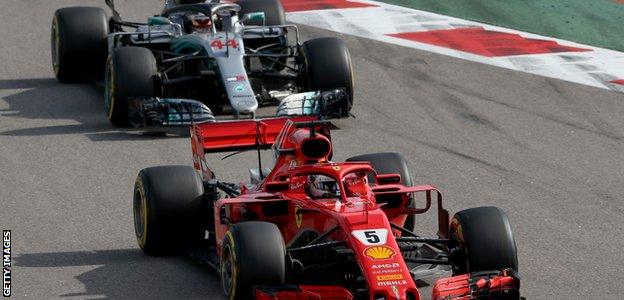
Sebastian Vettel is without a win since the Belgium Grand Prix
Hamilton is not one to mess about in these situations, and he immediately set about attacking Vettel.
The Mercedes went for the inside down the long straight towards Turn Two, but was robustly rebuffed through the kink of Turn One. Hamilton was right on Vettel's gearbox going through the long Turn Three and dived for the inside into Turn Four.
Vettel said: "Valtteri was backing off a bit, and then I was struggling in the last sector, so Lewis was close and then had a run into Turn Two. I managed to cover and then I didn't see him through the left-hander. I wasn't really sure where he was.
"I saw that he was somewhere on the outside but then I think you also need to be at some stage fair enough and give room, even if I didn't want to. But I had to, to make sure that it remains fair. Tough, or hard, but fair. But then he obviously got past."
As Hamilton put it: "Luckily, I'm thinking: 'They've got a fairly decent driver.' Because if I wasn't, we would have finished one and three today."
"It was an awesome move," Wolff said, "but it blistered the tyres."
Now, Mercedes had a quandary.
Wolff said: "We were in a situation that Valtteri was managing the tyres, Lewis behind with a blistered rear and Sebastian all over Lewis. And at that stage there were two possible outcomes.
"The best case would have been it stays like it is and Valtteri finishes first with Lewis second. The worst case was the blister wouldn't last until the end and Lewis would have been overtaken by Sebastian having to manage his tyres.
"With these tyres when you blister them, it is unknown what will happen. We saw it in Spa, we had to pit another time. And we saw it with Ferrari in Monza (where Hamilton passed Kimi Raikkonen for victory after the Finn had blistered his tyres).
"Imagine the scenario having to pit another time and finishing fifth or sixth rather than winning."
Bottas was leading. Hamilton needed him to go faster to relieve the pressure from Vettel. But Bottas was unable to pass Verstappen in front.
"That," Wolff said, "was the pressure moment where we made the call."
Should they have swapped them back?
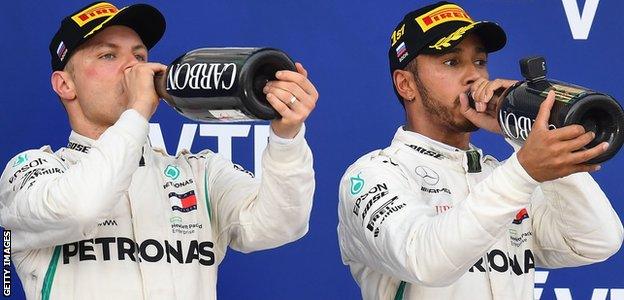
The four-time world champion tweeted after the race: "I always want to win in the right way and want to acknowledge Valtteri. He did an incredible job this weekend and the team made a tough decision."
The first time Mercedes made a call to Bottas to cede position to Hamilton was at last year's Hungarian Grand Prix. In that case, Hamilton gave the position back on the last lap. This time, that did not happen. Why?
In Hungary, the condition prior to swapping the drivers was that Hamilton would give the position back if he could not pass the Ferraris ahead. He was true to his word. This time, there was no such condition.
Hamilton said: "From the moment it happened, Budapest was replaying in my mind. That was a great feeling. It is never a good feeling losing a position, but it felt right and justified.
"But we did get later in the championship and think: 'What happens if we lose the championship by one point? We are going to look back at that race and think we didn't work together as a team.'"
Hungary, Wolff explained, was in July, with half the season still to go. Now, the end of the season is in sight.
"We did it in Hungary last year," Wolff said, "but we are five races from the end and it is about seven points up and down. And as much as it is difficult to make such a call, somebody has to do it and this is why we didn't think about switching back any more."
A brief history lesson
After the race, comparisons were made with Ferrari's infamous decision to swap their drivers in Austria in 2002., external Schumacher had won four of the first five races and was utterly dominating the championship but Rubens Barrichello was forced to hand over victory on the last lap of the race.
Wolff, in perhaps the most controversial comment he made, said that was "the right call - but maybe they didn't communicate it with finesse".
But then he went some way to contradicting himself, and aligning himself with the general feeling that Ferrari's call that day was unnecessary, when he added: "Austria was the sixth race of the season and they won the title in July."
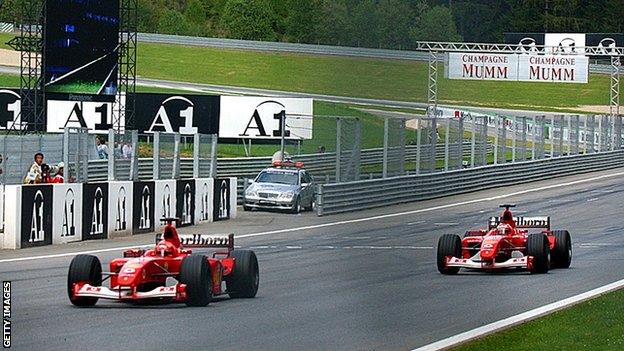
Rubens Barrichello was ordered to allow his Ferrari team-mate Michael Schumacher through to win the 2002 Austrian Grand Prix...
There is a special irony here, in that while Ferrari have historically been the team most associated with team orders, this year they have shied away from them - and it has bitten them.
Only two races ago, Ferrari were criticised for not employing team tactics in qualifying in Italy. That resulted in Raikkonen taking pole from Vettel. The two then raced on the first lap and Vettel crashed into Hamilton and spun, while Hamilton went on to win the race.
"Remember how much grief Ferrari got for having Kimi on pole and the first couple of corners which weren't helpful for Sebastian?" Wolff said.
"They were told they were wrong for not being as calculated as they should be. Now, we are calculated, still with the racer's heart, and people think we are unsporting. So whatever you do, you can't do the right thing."
"(Ferrari's) normal scenario would be like this," Hamilton said, "Through history. But you see in Monza they didn't do it, which I don't really understand. But if they went back I'm sure they would have done it in that race."
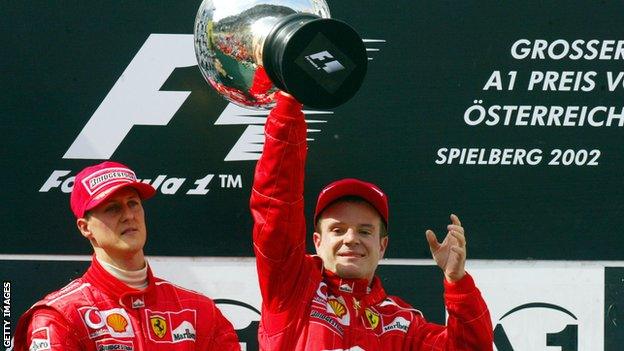
...Schumacher refused to take the top step on the podium after the race, sending Barrichello centre stage instead
Did Mercedes overreact?
Was this decision, like Austria 2002, also unnecessary? Some believe so. After all, it made the difference between a 43-point lead and a 50-point lead.
But Wolff said he had spent "half the night thinking about it and about Austria 2002 and the implications for the brand. But it is a simple enough call to make."
He reminded his audience that in Austria this year Mercedes lost a one-two through a double retirement.
"It is a solid advantage but you saw Austria," he said. "We were one-two and ended up with nothing.
"You go to Suzuka and Austin (the next two races) and have a disastrous weekend and the gap rather than being 25 points is 18. And with four races to go that becomes a completely different situation.
"I agree it's tough and maybe we are playing too safe. But I have seen freak results, things overturned quickly and this season we have seen it comes in waves. Ferrari is the dominant car for two or three races and then it's us again. So you cannot take today's performance for granted.
"You need to consider the championship and if it at the end five or three points are missing, you are the biggest idiot on the planet of having prioritised Valtteri's single race result in Sochi over the championship."
Vettel, for the record, said he backed Mercedes' decision. "In the position they were in," he said, "it was a no-brainer what they did today. So maybe not all the questions are justified."
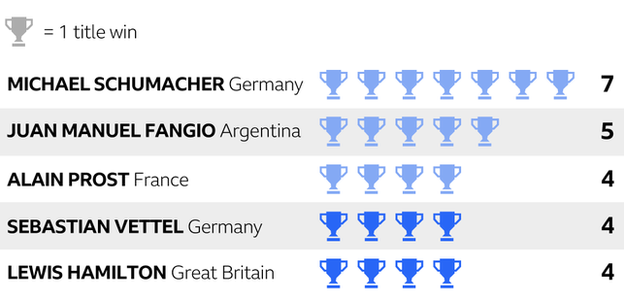
The fight for a coveted fifth world title
- Published27 September 2018
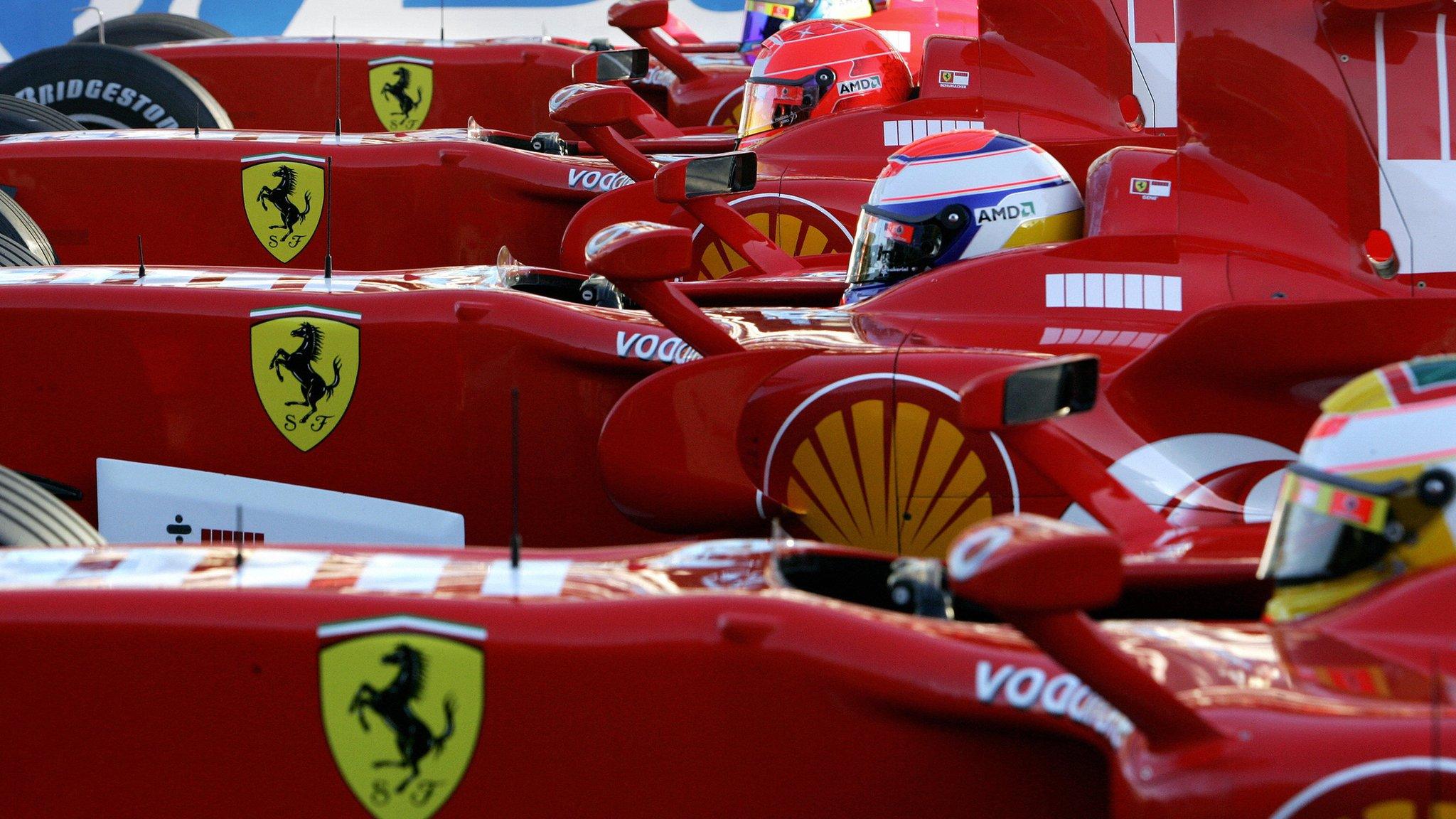
- Published21 November 2018
